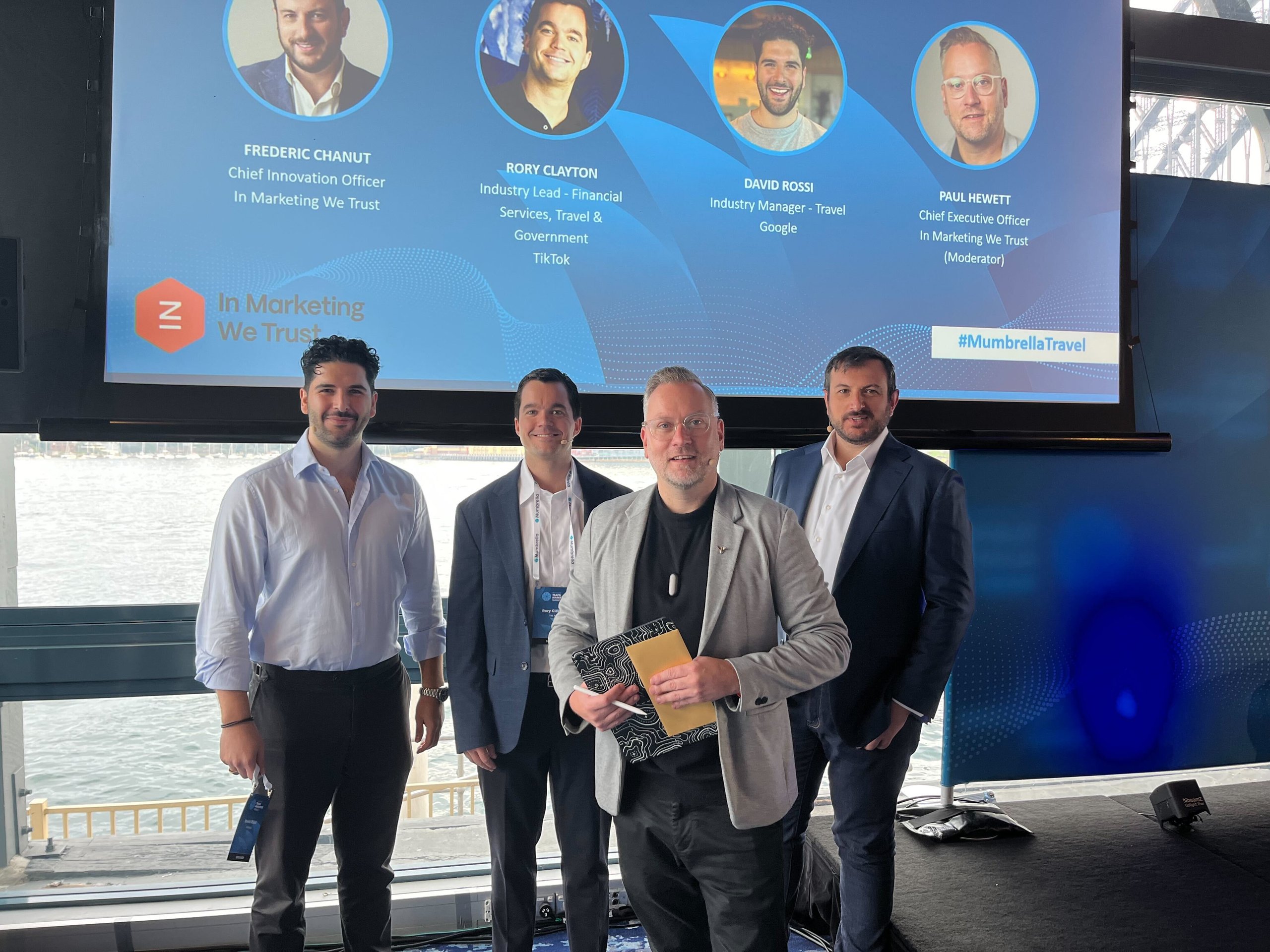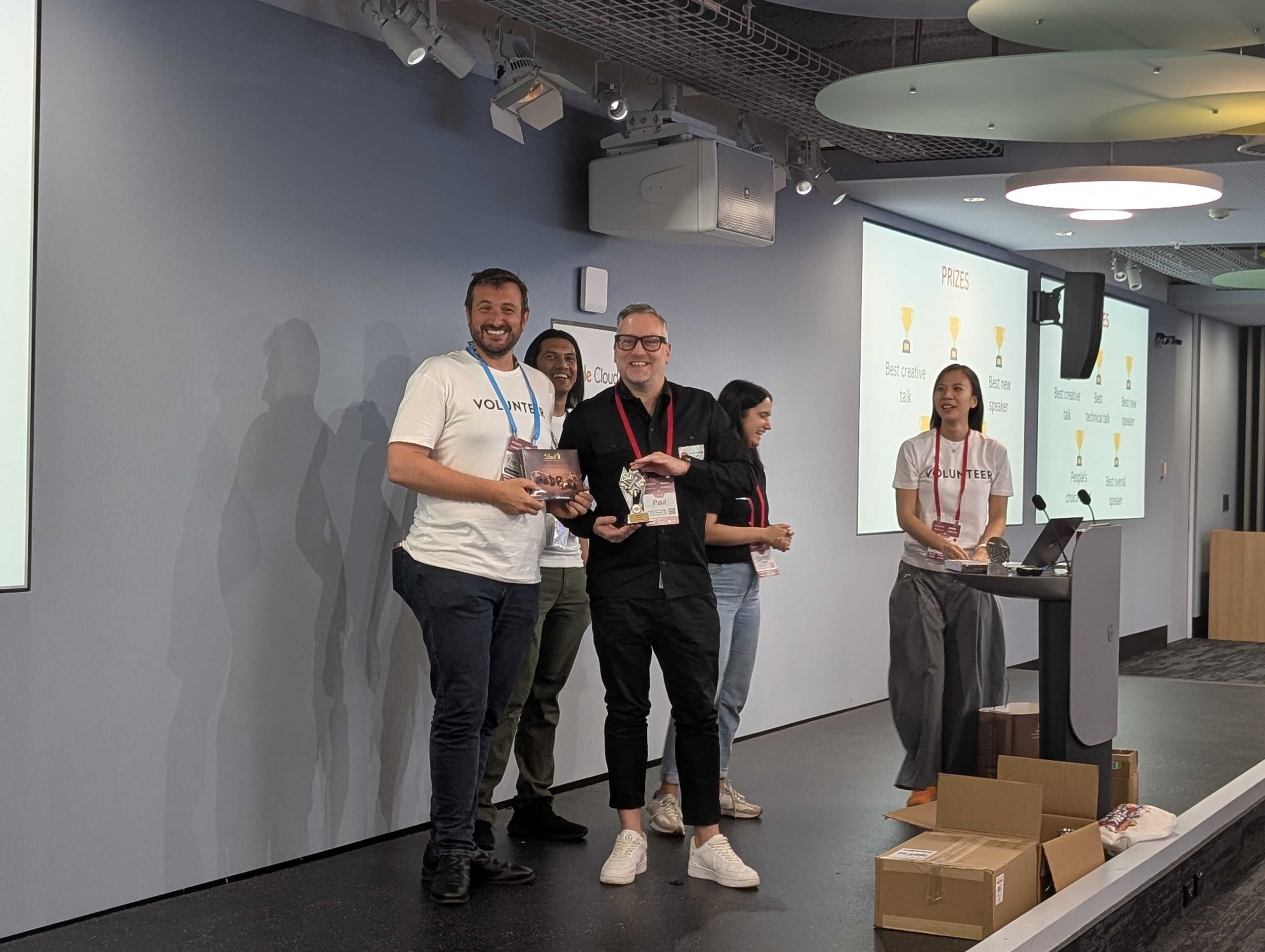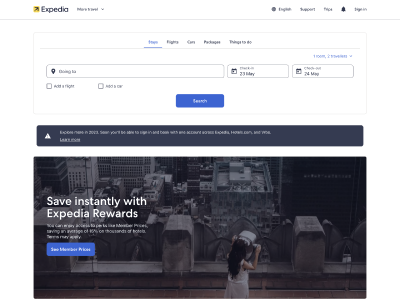During November (2024) we sponsored Mumbrella’s Travel Marketing Summit and hosted a breakfast panel with Google & TikTok.
As consumer search habits evolve, the travel industry must stay in tune with these shifts. Social media platforms like TikTok are no longer solely entertainment spaces; they’re pivotal parts of the travel planning process. Meanwhile, advances in artificial intelligence (AI) and visual search are reshaping how travellers discover and engage with travel brands online. During Mumbrella’s Travel Marketing Summit breakfast session, industry leaders from Google, TikTok and In Marketing We Trust gathered to explore how the future of search is transforming travel marketing.
Read on for a transcript of the session to read what Freddy, and industry leads at TikTok and Google had to say about the Future of Search in Travel, and then download our Future of Search in Travel whitepaper to learn more.
Moderated by Paul Hewett, CEO of In Marketing We Trust, the panel featured insights from Frederic Chanut, Chief Innovation Officer at In Marketing We Trust; Rory Clayton, Industry Lead at TikTok; and David Rossi, Industry Manager – Travel at Google. Through a discussion on AI, consumer behaviour and the growing importance of visual and conversational search, they shared actionable strategies to help travel brands harness these shifts.
Transcript: The Future of Search in Travel Panel at Mumbrella Travel Marketing Summit
Paul Hewett (Moderator):
“Welcome, everyone! Before we start, I want to acknowledge the Eora Nation, the traditional custodians of the land we meet on today, and pay my respects to Elders past, present, and emerging.
“My name is Paul Hewett, CEO of In Marketing We Trust. We’re a search-specialist agency working with travel brands across the APAC region. Today’s session is focused on helping you understand the latest trends in travel search and how you can apply these insights to your marketing strategies. With me today are Frederic Chanut from In Marketing We Trust, Rory Clayton from TikTok, and David Rossi from Google.
“Let’s begin with a quick introduction—can each of you tell us a bit about your role, your company, and a fun travel fact?”
Frederic Chanut:
“I’m Frederic, Chief Innovation Officer at In Marketing We Trust. I’ve spent years immersed in search strategy. Here’s a fun fact—I’ve done keyword research everywhere, from the Siberian tundra to Alaskan outposts.”
Rory Clayton:
“I’m Rory, the Industry Lead for Financial Services, Travel & Government at TikTok. Did you know the shortest commercial flight in the world is 1.5 minutes, between two islands in Scotland? Imagine the hassle of security for a flight shorter than your average song!”
David Rossi:
“Hi, everyone. I’m David from Google, where I work as an Industry Manager focused on Travel. Here’s an insight into travel search:
“Google Lens now processes over 20 billion visual searches monthly, with 25% of those being commercially oriented. That’s a huge shift toward visual search in travel.”
The Changing Landscape of Travel Search
Paul Hewett:
“To kick things off, I’d like each of you to share what you believe are the top trends currently transforming travel search. Frederic, could you start?”
Frederic Chanut:
“Certainly. I’d say there are three significant trends reshaping travel search today:
1. Social Media as a Search Engine: Travellers aren’t only turning to traditional search engines; they’re using social platforms like TikTok to discover new destinations, hotels, and activities. This shift means travel brands must be active on social platforms and use visuals effectively to capture attention.
2. AI-Powered Personalisation: AI is creating a more fragmented search landscape, with personalised and predictive search options on both traditional engines and newer platforms.
3. Visual and Voice Search: More travellers now use video and images to plan their trips. With Google Lens handling billions of visual searches and the growing popularity of voice search, it’s clear that the future is no longer text-driven—it’s about creating rich, visual content that resonates with users.”
Paul Hewett:
“That’s incredibly insightful, Frederic. Rory, could you share what trends TikTok is seeing in how users are planning and discovering travel?”
Rory Clayton:
“Absolutely. TikTok is no longer just a platform for entertainment; it’s a search tool. Currently, we’re seeing about 3.2 billion daily searches, with 25% of our user base using search within seconds of opening the app. People aren’t just watching videos; they’re actively seeking travel inspiration.
“One of the biggest trends is what we call ‘video-first search behaviour.’ Users come to TikTok to get real, immersive insights through videos. They want to see genuine experiences from other travellers, whether it’s exploring local food scenes or scouting out beaches. Our stats show a 980% increase in travel-related searches over the last few years.”
Paul Hewett:
“And David, what’s happening on the traditional search side over at Google?”
David Rossi:
“Google is seeing similar trends with the rise of visual and conversational search. Google Lens, for example, is currently processing over 20 billion queries monthly. And 25% of those searches have commercial intent, meaning people actively seek to decide based on what they see.
“Another area we’re watching closely is conversational search. More users are phrasing their queries conversationally, expecting precise answers, like ‘hotels with Acropolis views and pools.’ This shows a shift toward more dynamic, AI-driven interactions where consumers want specifics and expect their needs to be met immediately.”
Exploring Platform-Specific Advancements
Paul Hewett:
“With these insights in mind, what are some advancements we can expect in travel search technology? David, could you start with Google?”
David Rossi:
“Definitely. At Google, we focus on ‘privacy-durable measurement’, developing tools that provide insights while respecting user privacy. Tools like Google Analytics 4 and enhanced conversions help capture meaningful data, which is crucial for marketers.
“We’ve also launched specific travel products, like Hotel Ads and our ‘things to do’ experience, which give travel brands greater visibility. And our Performance Max feature allows campaigns to reach audiences based on intent signals, which drives more relevant engagement.”
Rory Clayton:
“At TikTok, we’re seeing a surge in search activity. To meet this demand, we’re testing search advertising features, like keyword bidding and negative keywords, to offer a more tailored approach for brands. We’re focused on helping brands capture that initial spark of inspiration while people are actively searching on TikTok.”
Effective Measurement Across Channels
Paul Hewett:
“Measurement is such a crucial aspect. Frederic, how do you recommend brands measure the impact of search and social channels in this shifting landscape?”
Frederic Chanut:
“It’s all about multi-touch attribution. We need to embrace a privacy-first approach while making sure we’re capturing the full journey. With iOS updates and other privacy changes, relying on traditional tracking methods is no longer effective. Brands need to measure not just final conversions but the entire user path, from the initial discovery on social media to the final booking. It’s essential to use robust tracking and bring rigour to the way you measure across channels.”
Rory Clayton:
“On TikTok, we’re introducing tools like conversion lift and synergistic measurement between TikTok and traditional search platforms. These insights allow brands to see the compound effects of using search on TikTok alongside other channels like Google.”
David Rossi:
“Google has developed lifecycle tools like Google Analytics 4 and new customer insights reporting, which help brands understand the complete customer journey. By focusing on these insights, travel marketers can get a comprehensive view of how each channel contributes to growth.”
In Marketing We Trust Interview with Google & TikTok
The breakfast session at Mumbrella Travel Marketing Summit highlighted how social platforms, visual content, and AI revolutionise travel search. Travellers are no longer confined to traditional search engines; they use social media to gather travel ideas, use visual tools to identify destinations and expect AI to deliver highly personalised results.
With Google focusing on AI-enhanced tools and privacy-friendly data solutions and TikTok emerging as a powerful search platform, brands must embrace these developments to remain competitive. Travel marketers can navigate the changing search landscape by integrating visual storytelling, privacy-first measurement and cross-channel strategies.
This session underscored that the future of travel search is multifaceted, immersive, and more consumer-centric than ever.
Download our Future of Search in Travel whitepaper to learn more.


















